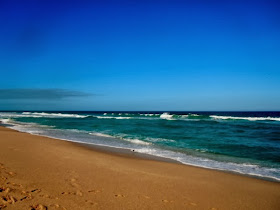Sebastian Inlet State Park, from the file picture below, is an where the Atlantic (bottom) has access to the inland lagoon area. We put our kayaks into the water where you see the white area on the left and paddled across the inlet over to the area on the right. Around the islands and the mangroves.
A little history on the Sebastian Inlet shows that prior to this inlet being dug out that the water quality on the lagoon side into which the Sebastian and Indian Rivers flowed was diminishing . Algae blooms were killing the fish and the oyster populations were disappearing. Starting in 1872 attempts were made to open an inlet from the Atlantic Ocean into the lagoon. Over the years many attempts were made but failed. The sixth attempt in 1905 managed to open a channel but it filled in with sand before long. By 1914 the lagoon system was nearly a dead body of water. There was much fighting over whether or not the inlet should be cut. But after two more attempts the inlet was opened in 1923 and in 1924 the jetties were built from rock to keep the sands from filling it in again. Those rock jetties only lasted until the first big storm when they were washed away. They were eventually replaced by granite rock which is much denser and have become permanent. This has opened the lagoon to fishing, sailing, etc and allowed the waters to be flushed and cleaned.
So today we put the kayaks into the water and headed across to the north side of the inlet.
A fair hike across the open water.
On the north side we paddled through some mangrove. Saw some sting rays and lots of fish jumping out of the water.
My three buddies following along behind me. I was the leader of the pack today.
Tom was having a little rest. Just rockin' and rollin' on the waves.
After about 2 1/2 hours on the water we headed back. It was a tough paddle on the open water going against the waves and into a fairly strong wind. But we made it back and saw some hermit crabs wandering around near shore.
And this star fish was there to meet us also.
Tom and John got the kayaks loaded up and ready to hit the road.
We drove north across the bridge and pulled into a stop where we could access the Atlantic Ocean to take a nice long walk on the beach. After all that time in the boats we needed to stretch our legs.
John had won our "Biggest Loser" contest and decided that he would use his winnings and buy us all dinner one night. Well tonight was the night. We stopped at the Olive Garden in Vero Beach for an excellent meal before driving home. What a guy!! Thanks John.
A perfect day from start to finish. Hope your day was as good as ours. Until next time - safe travels.










That was a beautiful star fish. Haven't seen one like that before
ReplyDelete